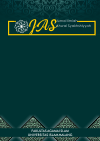EXISTENCE AND PROBLEMATICS OF ISLAMIC LAW (FIQH AL JA'IHAH) POST-PANDEMI COVID-19
DOI:
https://doi.org/10.33474/jas.v4i2.18921Abstract
The purpose of this paper is to describe the epistemological approach used in the Fiqh Pandemic format, and examine the features of Islamic law and mapping the problems that will be faced by Islamic law in the post-pandemic co-19 period. Research in this context has not been carried out by many Muslim scholars in Indonesia. Therefore, this paper is very feasible as an initial stage in initiating the theory of pandemic fiqh. This research method is part of what is called library research in which the data sources are obtained from books, articles and other sources. The results of the study conclude that the epistemological approach that can be used in the idea of forming pandemic fiqh is to rely on reading normative texts that are relevant to the concept of emergency conditions and the use of several fiqhiyah qaidah which are also related to emergency conditions. As well as combined with modern legal theory developed by Western thinkers. Meanwhile, the problems faced by Islamic law after the Covid-19 pandemic are various challenges regarding contemporary social problems, contemporary and adaptive alternative epistemological ideas, provision of human resources (mujtahid or ijtihad expert scholars), implementation of maqashid al sharia, formulation of buildings pandemic fiqh and thematic fiqh formulation.
Keywords: Problems, Islamic Law, Fiqh Pandemic
EKSISTENSI DAN PROBLEMATIKA HUKUM ISLAM (FIQH AL JA’IHAH) POST-PANDEMI COVID-19
Abstrak
Tujuan dari tulisan ini adalah untuk mendeskripsikan pendekatan epistemologis yang digunakan dalam format Fiqh Pandemi, dan mengkaji keistimewaan hukum Islam dan pemetaan masalah-masalah yang akan dihadapi oleh hukum Islam pada masa post-pandemi covid-19. Penelitian dalam konteks ini belum banyak dilakukan oleh sarjana muslim di Indonesia. Oleh karena itu tulisan ini sangat layak dilakukan sebagai tahap awal dalam menggagas teori fiqh pandemi. Metode penelitian ini adalah bagian dari apa yang disebut sebagai penelitian kepustakaan yang sumber data nya diperoleh dari buku, artikel dan sumber-sumber lainnya. Hasil penelitian menyimpulkan bahwa pendekatan epistemologis yang bisa digunakan pada gagasan pembentukan fiqh pandemi adalah bersandar pada pembacaan pada teks-teks normatif yang relevan dengan konsep kondisi dharurat dan pemanfaatan beberapa qaidah fiqhiyah yang juga berkaitan dengan kondisi dharurat. Serta dikombinasi dengan teori hukum modern yang dikembangkan oleh pemikir Barat. Sedangkan problem-problem yang dihadapi hukum Islam pasca pandemi covid-19 adalah beragam tantangan mengenai problem sosial yang bersifat kontemporer, gagasan epistemologi alternatif yang bersifat kontemporer dan adaptatif, penyediaan sumberdaya manusia (mujtahid atau ulama ahli ijtihad), implementasi maqashid al syariah, perumusan bangunan fiqh pandemi dan perumusan fiqh tematik.
Kata kunci: Problematika, Hukum Islam, Fiqh Pandemi

